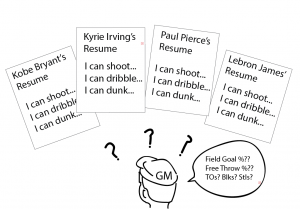
How do you pick your toothbrush? Aside from relying on brand loyalty, choosing the “right” brush can be a haphazard act of closing your eyes and pointing your finger. They all promise to reduce plaque buildup, give you a whiter smile and clean those hard-to-reach places. So where’s the real difference?
For a recruiter, selecting a candidate can be just as random as choosing a toothbrush because the applicants’ resumes and cover letters are all marketing the same dull, recurring themes. Certain common words and phrases may actually be a detriment to the impact of your application. How, then, does an applicant make his or her resume stand out? First, jettison these six phrases from your lexicon of professional qualities that employers simply do not need to hear.
1. “I am detail-oriented.” As opposed to what? Detail-averse? This cliche plagues many a resume as one may feel that suggesting they are aware of details proffers them some unspoken advantage in handling projects and tasks. Truthfully, we all analyze nuances and subtleties to a degree. The real difference between people is how comprehensive you can be with incorporating such details and data into a bigger picture or framework.
2. “I am a people person.” Leave that up to the recruiter to determine in the interview. Your resume may extensively list experiences that demonstrate interpersonal and group communication, but that does not necessarily mean you are a people-kind-of-person. How you conduct yourself professionally and respectfully in front of the employer will be the real indicator of your character.
3. “I am driven.” If not, then you need not apply. Recruiters will assume this on behalf of the applicant, especially when reviewing your resume’s content. Though it is great you want to express enthusiasm and motivation, being driven is almost unnecessary to state. Your experiences should be allowed to speak for themselves. Let’s hope you don’t even need to justify you are motivated in the first place.
4. “I am dedicated.” This is simply a bland, redundant descriptor. You could easily replace it with trustworthy, loyal or reliable, and the appeal of your application will not change in the slightest. This is also a point the recruiter will determine for him or herself.
5. “I am a good communicator.” This is an incredibly vague term. It entails countless interpretations. Does this mean a good small-group facilitator? A gifted presentation designer for meetings? Or a compelling public orator of JFK’s rhetorical caliber? Though solid communication skills are highly desirable, it is important to identify exactly what subset of skills you can bring to a new job.
6. “References available upon request.” This is an empty placeholder that can detract from the impact of the overall resume. It also eats up space that could otherwise be filled with exciting job descriptions and accomplishments. Employers are aware that you have a handful of people willing to validate your work ethic and personal integrity. But if references aren’t otherwise available, then there isn’t much else to discuss.
Selecting the “right” words can be a challenge, as you want to be original but not obscure with unpronounceable adjectives. Fortunately, the English language is abundant with other words that can more clearly describe you and articulate your unique strengths.
One way to narrow your language — if coming up with your own words just isn’t working — is to sit down with a mentor or supervisor. Ask for their input and honest perspective on what assets you have to offer. To avoid sounding like just another forgettable toothbrush ad, you must identify your niche and capitalize on your unique attributes to stand out.

